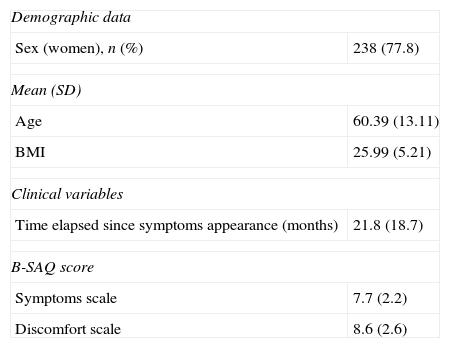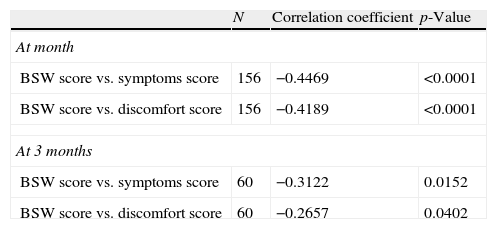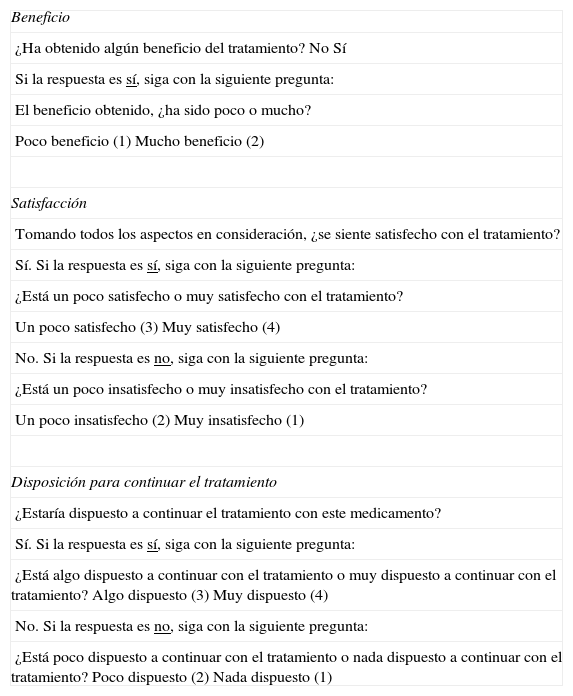To perform the linguistic and psychometric validation of the Spanish version of the BSW (Benefit, Satisfaction and Willingness to continue) questionnaire.
Material and methodsEpidemiologic, observational, multicenter, prospective (October 2008–February 2009) study in patients ≥40 years of age with de novo overactive bladder syndrome who started treatment with antimuscarinics by physicians assessment. Data were recorded at baseline (face-to-face) and the follow-up of the study after 1 and 3 months (closed surveys by phone). Morisky-Green questionnaire was used to assess compliance. Bladder Control Self-assessment Questionnaire (B-SAQ) and BSW questionnaire were completed, performing the validation of BSW.
Results312 evaluable patients were recruited, 93 remained until the 3 months visit. 65% and 71% of patients were not compliant with treatment at 1 and 3 months, respectively. The correlation between the BSW and the B-SAQ questionnaires after 1 and 3 months was moderate and statistically significant. The internal consistency between the BSW questionnaire items was high (Cronbach alpha: 0.89 at 1 month and 0.84 at 3 months). 92% of patients understood the questions and 84% were able to fill the BSW questionnaire without need of previous instructions (N=25).
ConclusionsThe BSW questionnaire has been shown to be a feasible, valid and reliable tool to know the patient self-assessment of the treatment, according to its psychometric properties.
Realizar la validación lingüística y psicométrica en español del cuestionario Beneficio, satisfacción y disposición para continuar el tratamiento (BSD).
Material y métodosEstudio epidemiológico, observacional, multicéntrico, prospectivo (octubre 2008-febrero 2009) en pacientes ≥40 años, con síndrome de vejiga hiperactiva idiopática de novo y que iniciaran tratamiento antimuscarínico bajo criterio clínico. Se recopilaron datos en la visita basal (presencial) y se realizó el seguimiento del estudio a través de encuestas telefónicas cerradas al primer y tercer mes desde el inicio. Se empleó el cuestionario de Morisky-Green para determinar el cumplimiento terapéutico y se completaron los Cuestionarios de Autoevaluación del Control de la Vejiga (CACV) y el BSD, realizándose la validación de este último.
ResultadosSe reclutaron 312 pacientes evaluables; en la visita de 3 meses se dispone de información de 93. El 65% y el 71% de los pacientes eran incumplidores con el tratamiento al mes y a los 3 meses, respectivamente. La correlación entre la puntuación del cuestionario BSD y las puntuaciones del cuestionario CACV al mes y a los 3 meses de inicio del estudio fue moderada y estadísticamente significativa. La consistencia interna entre los ítems del cuestionario BSD fue alta (alfa de Cronbach: 0,89 al mes y 0,84 a los 3 meses). El 92% había entendido bien las preguntas y el 84% no tuvo ningún problema para cumplimentar el cuestionario BSD sin instrucciones previas (N=25).
ConclusionesEl cuestionario BSD demostró ser una herramienta factible, válida y fiable para conocer la propia valoración del paciente sobre el tratamiento recibido, de acuerdo a sus propiedades psicométricas.












